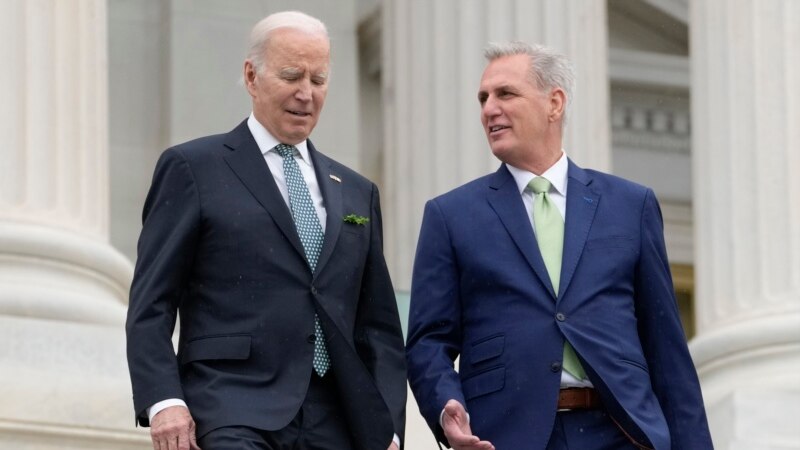
US President Joe Biden and House Speaker Kevin McCarthy will meet at the White House on Monday to discuss raising the government’s borrowing limit.
Negotiators for the two sides met for more than two hours on Sunday while Biden and McCarthy spoke on the phone in a call that each described as positive.
“It went well, we’ll talk tomorrow,” Biden told reporters upon returning to Washington from the Group of Seven summit in Japan.
McCarthy said the phone call was “productive.”
“I think we can solve some of these problems if you understand what we’re looking at,” McCarthy said. “But I’ve been very clear with him from the beginning. We have to spend less money than we did last year.”
The government could fall short and be unable to meet its financial obligations as soon as June 1.
Biden said Sunday that House Republicans need to move away from their “extreme position” on public spending and that there will be no deal on Republican terms alone.
“It is time for Republicans to accept that there is no bipartisan deal that can be done solely, solely, on their partisan terms,” Biden said at the end of the G-7 summit.
Biden indicated that he had done his part by offering ways to increase the country’s $31.4 trillion debt limit so the US government can continue to pay its bills, such as interest on government bonds, stipends for US retirees and payments to health care providers and the salaries of government employees and contractors.
Republicans in the House of Representatives have called for sharp cuts in government spending, rejecting alternatives proposed by the White House, which has called for closing tax loopholes and more limited spending cuts. Past presidents and congressional leaders struck deals to increase the country’s debt limit 78 times in negotiations in which neither side got everything on their wish list.
This time, Republicans want higher work requirements for poor people without disabilities who receive government assistance, but Democrats say that under such a proposal, several hundred thousand people could lose the benefits they now receive. Republicans are also seeking funding cuts for the country’s tax-collection agency and are asking the White House to agree to provisions of his proposed immigration reform bill to stem the wave of immigrants trying to enter the US at the Mexican border.
The White House has responded by keeping defense and non-defense spending flat for the next budget year starting Oct. 1, which would save $90 billion in 2024 and $1 trillion over 10 years.
There are less than two weeks left until June 1, when the Treasury Department has warned that the federal government may be unable to pay all its debts. That would trigger a default that could throw financial markets into chaos and send interest rates skyrocketing.
“A lot of what they’ve already proposed is just, frankly, unacceptable,” Biden said. “It’s time for Republicans to accept that you can’t get to a bipartisan deal alone, only on your partisan terms. They have to move too.”
The talks have become increasingly heated over the past two days. Democratic and Republican negotiators said Friday’s meetings on Capitol Hill yielded no breakthrough and the two sides did not meet on Saturday.
Instead, each has once again characterized the other’s position as extremist.
“Unfortunately, the White House has backed down,” McCarthy told reporters on Saturday.
Biden said he believed he had the authority to invoke the 14th Amendment to the Constitution, which allows him to raise the debt ceiling without Congress, but it was not clear there would be enough time left to try to use that unproven legal theory to avoid the default.
Treasury Secretary Janet Yellen said in a television interview Sunday that June 1 remains a “deadline” for raising the federal debt ceiling, telling NBC News that the chances were “pretty low” of that the government will collect enough revenue to pay its bills until June 15, when more tax revenue will come in.
A source familiar with the negotiations said Republicans had proposed increasing defense spending while cutting overall spending.
The source also said House Republicans wanted to extend tax cuts passed under then-President Donald Trump, which would add $3.5 trillion to the federal debt.
With Republicans holding a slim majority in the House of Representatives and Democrats tight control of the Senate, no deal can pass without bipartisan support.
[Parte de la información para este artículo provino de The Associated Press, Agence France-Presse y Reuters]
Connect with the Voice of America! Subscribe to our channel Youtube and activate notifications, or follow us on social networks: Facebook, Twitter and Instagram.



![[Img #74661]](https://thelatestnews.world/wp-content/uploads/2024/12/The-power-of-ultrasound-150x150.jpg)









